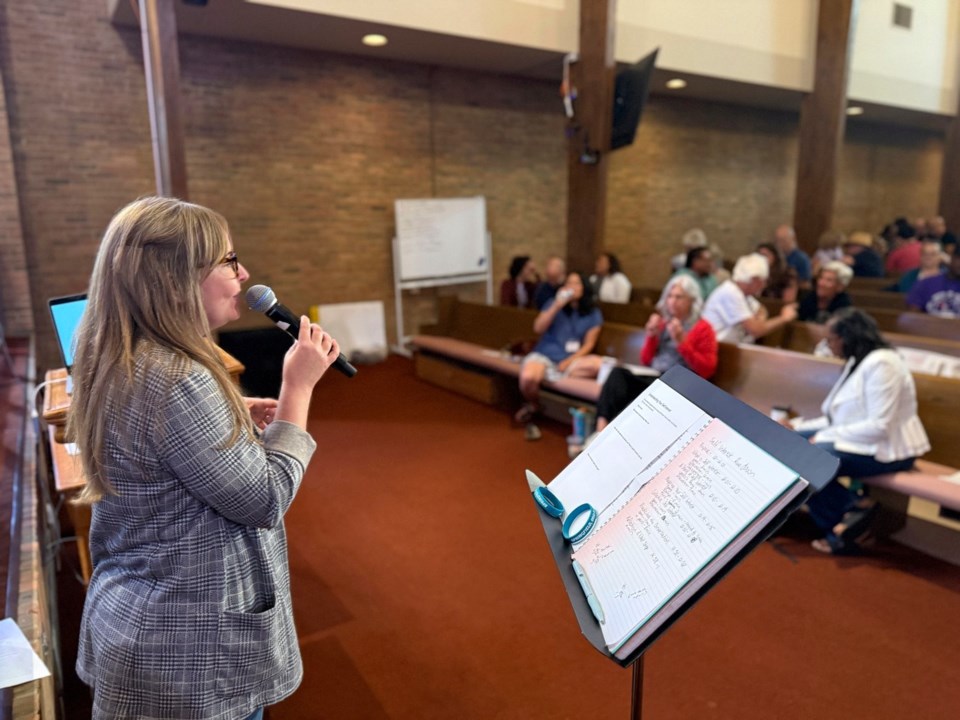SPRINGFIELD, Ohio (AP) — An Ohio city whose Haitian migrants were disparaged by President Donald Trump last year as he pitched voters on his plans for an immigration crackdown is now bracing to defend the community against possible deportation.
A group of about 100 community members, clergy and Haitian leaders in Springfield, Ohio, gathered this week for several days of training sessions as they prepare to defend potential deportees and provide them refuge.
“We feel that this is something that our faith requires, that people of faith are typically law-abiding people — that’s who we want to be — but if there are laws that are unjust, if there are laws that don’t respect human dignity, we feel that our commitment to Christ requires that we put ourselves in places where we may face some of the same threats,” said Carl Ruby, senior pastor of Central Christian Church.
Ruby said the ultimate goal of the group is to persuade the Trump administration to reverse its decision to terminate legal protections for hundreds of thousands of Haitians in the U.S. under temporary protected status, or TPS.
“One way of standing with the Haitians is getting out the message of how much value they bring to the city of Springfield,” he said. “It would be an absolute disaster if we lost 10,000 of our best workers overnight because their TPS ends and they can no longer work.”
In lieu of that, Ruby said participants in the effort are learning how to help Haitians in other ways. That includes by building relationships, accompanying migrants to appointments with U.S. Immigration and Customs Enforcement and providing their families with physical shelter.
Springfield in crosshairs of immigration debate
Springfield found itself in an unwelcome spotlight last year after Trump amplified false rumors during a presidential debate that members of the mid-sized city's burgeoning Haitian population were abducting and eating cats and dogs. It was the type of inflammatory and anti-immigrant rhetoric he promoted throughout his campaign.
The U.S. Department of Homeland Security announced in June that it would terminate TPS as soon as Sept. 2 for about 500,000 Haitians who are already in the United States, some of whom have lived here for more than a decade. The department said conditions in the island nation have improved adequately to allow their safe return.
The announcement came three months after the Trump administration revoked legal protections for thousands of Haitians who arrived legally in the country under a humanitarian parole program as part of a series of measures implemented to curb immigration. The U.S. Supreme Court overturned a federal judge’s order preventing the administration from revoking the parole program.
Earlier this month, a federal judge in New York blocked the administration from accelerating an end to Haitians' TPS protections, which the Biden administration had extended through at least Feb. 3, 2026, due to gang violence, political unrest, a major earthquake in 2021 and several other factors.
DHS spokeswoman Tricia McLaughlin said at the time that the Trump administration would eventually prevail and that its predecessors treated TPS like a “de facto asylum program.” In the meantime, the government has set the expiration date back to early February.
TPS allows people already in the United States to stay and work legally if their homelands are deemed unsafe. Immigrants from 17 countries, including Haiti, Afghanistan, Sudan and Lebanon, were receiving those protections before Trump took office for his second term in January.
Residents ponder what actions to take
Charla Weiss, a founding member of Undivided, the group that hosted the Springfield workshop, said participants were asked the question of how far they would go to help Haitian residents avoid deportation.
“The question that I know was before me is how far am I willing to go to support my passion about the unlawful detainment and deportation of Haitians, in particular here in Springfield,” she said.
It was something Weiss said she continued to contemplate “as an organizer, as a mother, as an African-American who was brought to these states that my ancestors in 1619” throughout the training. “So it is an unanswered question. But I’m willing to continue to look at that question. What will I do? How can I do it? And the other question is, for me, is like, who else will I bring with me?”
Republican Ohio Gov. Mike DeWine, a longtime supporter of the Haitian community, was briefed by Springfield leaders during a visit to the city Friday. He told reporters that the state is bracing for the potential of mass layoffs in the region as a result of the TPS policy change, a negative for both the workers and the companies that employ them.
“It's not going to be good,” he said.
___
Smyth reported from Columbus, Ohio.
Obed Lamy And Julie Carr Smyth, The Associated Press



